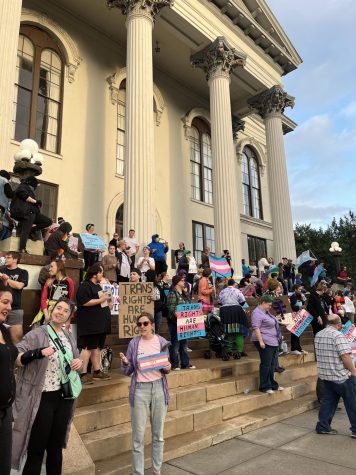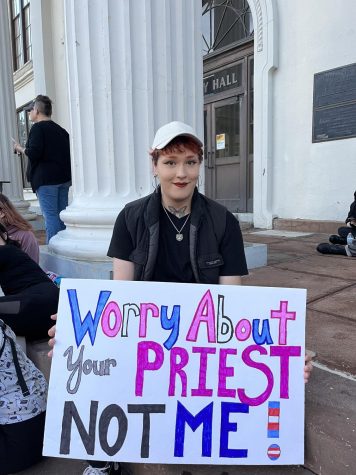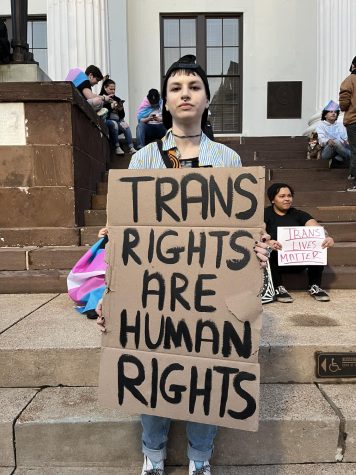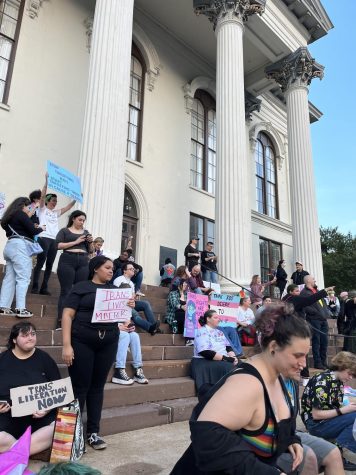Wilmington residents protest for trans rights

Dozens of people gathered on the steps of Thalian Hall on International Transgender Day of Visibility to protest for trans rights. Every year, March 31 is dedicated to recognizing trans visibility and rights. Trans Day of Visibility was initially created by transgender activist Rachel Crandall in 2009 to foster joy and celebrate transgender people.
Although the protest was meant to be peaceful, a straggler from the group was put in a headlock by an unidentified individual, who then threatened their life. Both people involved quickly left the scene, but the witness’s contact information was collected in the case that the victim chose to press charges. More information on this incident is not known at this time.
In the past few months, a wave of legislation affecting trans people, literature and culture has actualized in federal, state and local legislative bodies. The demonstration at Thalian Hall, organized by Wilmington resident and trans rights activist Kaylyn [last name excluded for anonymity], was coordinated for the purpose of bringing together the local trans community and allies in order to peacefully protest for trans people’s rights to safety and healthcare.
“It’s absolutely terrible and heartbreaking that this even has to happen,” said Kaylyn. “It’s absolutely disgusting that we have to be here. It’s one thing getting together as a community for Trans Day of Visibility–that’s absolutely fantastic. The fact that we are out here fighting and yelling about healthcare for other humans–why does that have to happen? That’s absolutely disgusting.”

Flyers for the protest were posted both on social media sites, such as Instagram and Facebook, and also pinned in various Wilmington businesses. Kaylyn obtained a permit to march from the city, which allowed the group to do one circle of the predetermined downtown route.
Shiloh Santos is a local transgender social media creator who uses her platform to provide trans representation and fight for LGBTQ+ rights. She had heard about the protest from a friend the night before. Santos is originally from a small town in central North Carolina, so the Friday night protest was her first ever for the issue of trans rights.
“As a trans woman, I have had a very hard time finding people who understand the basic concept of, ‘I call you by what you go by, every single day. Not just because you pass as whatever gender you look like, but because other people call you that, and that’s what you want,’” said Santos. “Even if I don’t look like what you want me to look like, or I’m not passing, I deserve the respect to be called what I wish to be called. If I’m calling you what you want, you call me what I want, and that’s it. It’s just basic respect, regardless of your opinions.”
Santos reflected on the difficulties that transgender people face in daily life, including job security and adequate healthcare. She noted that these issues are more pressing for neurodivergent transgender people, such as those with autism.
“It’s even rougher sometimes for non-binary individuals, because not only are there fewer of them in the statistics, but people don’t get it and they take it as a joke,” Santos explained. “‘Oh, I identify as Elmo.’ It’s not like that. It’s not some joke. It’s purely an identity, and it’s one small part of a whole person, and that’s another reason you should respect it.”

Protesters walked up and down N and S Front Street, with several individuals leading call-and-response chants like “Trans rights are human rights” and “We will not be quiet, Stonewall was a riot.” Cars driving past the protest would honk in support, with cheers from the protestors in response. About halfway through the demonstration, several participants also walked around and offered naan to others.
Greer [last name not included for anonymity] was also a first-time protester who heard about the protest the night prior, and decided to join.
“When I come out to protest, it is about trans people and it’s about my experience as a trans person, but it’s also about everyone else’s rights and not just trans people,” said Greer. “It’s about everyone, because if they can take away one group’s rights, they can take away everyone’s rights. So I’m here to fight for everybody.”
Another member of the protest was Laura Traister, a student in UNCW’s Creative Writing MFA program who attended the demonstration with several friends from her program. She learned about the protest the morning of through the Facebook page of Queer Youth Assemble, a national, queer, youth-led nonprofit dedicated to serving LGBTQ+ youth under 25. She also heard about the protest through UNCW’s Office of the Arts.
“The Office of the Arts partnered to show a documentary, ‘Mama Bears,’ about a community of women who have queer children who are conservatives, but eventually open their minds,” said Traister of the recent screening. “The intersection of faith and sexuality is very interesting to me.”
The documentary was shown on March 24 at the community cinema theater, Jengo’s Playhouse, on Princess Street. The plot revolved around a private Facebook group of Christian mothers as they supported each other and processed the issues they were raised on in their evangelical churches. The screening of ‘Mama Bears’ took place in part due to a grant from the National Endowment for the Arts.

In 2019, the American Medical Association (AMA) declared violence against trans people, and Black trans women in particular, an epidemic. According to The Williams Institute, a think tank at UCLA’s School of Law, transgender people are over four times more likely than cisgender people to be victims of rape, sexual assault, aggravated assault and other violent crimes. This data was pooled by researchers from the 2017 and 2018 National Crime Victimization Survey, and published in the American Journal of Public Health.
“I hope that a lot of people start to take our cause more seriously because I feel like not everyone does,” said Greer. “I hope that people can just come to realize that we’re like everyone else, and we’re not asking for anything special.”
LGBTQ+ youth can get support through the Trevor Project at 888-488-7386, the Gay, Lesbian, Bisexual and Transgender National Hotline at 888-843-4564, and locally with the LGBTQ Center of The Cape Fear Coast at 910-262-0327.







